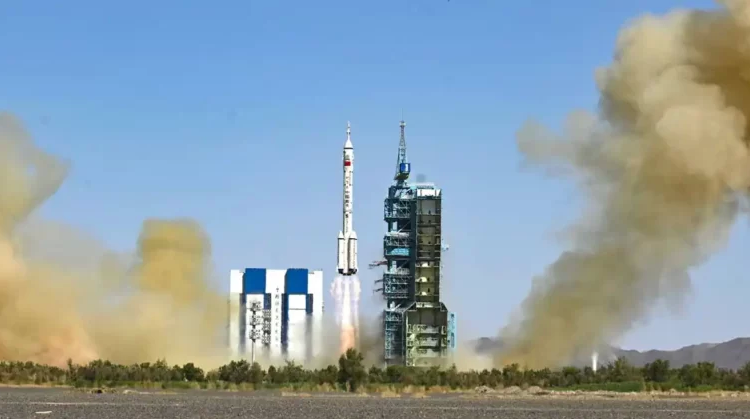The Federal Government of Nigeria has inaugurated an integrated satellite called DELSAT-1 to enhance the operational capacity of the Nigerian armed forces against insecurity.
This will assist in realising the nation’s sectoral strategies that respond to identified threats to Nigeria’s national interests, such as the National Defense Policy, National Counter Terrorism Strategy and the National Policy on Public Safety and Security.
China’s 18-story Long March 3B rocket likely launched DELSAT-1 into space from the Xichang launch base in Sichuan province in southwestern China.
Inauguration of DELSAT-1 took place at the Headquarters of the Defence Space Agency Obasanjo space center, Lugbe on Tuesday, 20 December 2022.
The Minister of Defence, Maj.-Gen. (retd) Bashir Magashi, is looking for more funding of satellite space technology to enhance operational capacity of the Nigerian Armed Forces.
Magashi, who was represented by the Chief of Defence Staff, Gen. Lucky Irabor, made the call at the inauguration of operational facilities for the Defence Space Administration (DSA), Tuesday in Abuja.
Satellite and space technology key to improving military operations
The Minister stated that satellite and space technology remained key to increasing the capacity of the armed forces and enhancing their operations across the country.
He also called for the protection of the nation’s investment in satellite and space technology, so as to enjoy the full spectrum of its benefits.
According to the CDS there are plans to deploy additional 5 satellites.
Egypt, Algeria, South Africa and Nigeria are the only African countries with military satellites.
In his remarks, the Chief of Defence Administration, Rear Adm. Nnamdi Muogilim said the project was the first of its kind and would support the operations of the armed forces in addressing insecurity in the country.
He said that the objective was to create a robust indigenous space competence capable of producing and utilising space assets to meet the operational requirements of the military and other security agencies.
Efforts to create a robust indigenous space competence
In 2018, the Nigerian Space Research and Development Agency (NASDRA) – the agency in-charge of coordinating all Nigerian space activities claims that its constellation of satellites could be the hub for out-of-space monitoring and tracking of aviation globally. The agency believes that it has the capability to locate any airborne plane within and outside Nigeria.
DELSAT-1 will carry out these functions; Geospatial-Intelligence, Monitoring and tracking of adversaries, Mapping and terrain analysis, Vulnerability assessment, Search and resources, and
Monitoring offshore infrastructure.
DELSAT-1 will be essential in solving the threats to national security by advancing the promotion of peace and security. Nigeria faces many threats to national security.
In addition, DELSAT-1 will aid the National Counter Terrorism Strategy (NACTEST) in ensuring public safety through the established implementation strategy, Forestall, Secure, Identify, Prepare and Implement (FSIPI).
Nigeria’s space ambitions
Nigeria’s space ambitions began as early as 2002, when the Assistant General Director of Training and Capacity Building at NASRDA made a presentation paper setting out a 28-year roadmap for the research, developing and launching of satellites from Nigeria by 2030.
The roadmap outlined the agency’s vision to develop, build and launch a Nigerian-made satellite on or before 2030.
Defence Space Administration
Subsequently, a few months after the Nigerian Vice-president Professor Yemi Osinbajo signed the Defense Space Administration Bill into law on February 18, 2017, previously passed by the National Assembly, the Nigerian Military commissioned the Defence Space Administration Office Complex and the Foundation Laying of Defence Cyber Operations Centre, at Obasanjo Space Centre, Abuja.
At the time, the Nigerian Chief of Defence Staff, General Gabriel Olonisakin, said that the Nigerian Military would utilize space technology to secure the country’s territorial interest. He said that utilizing space capability in various military operations would boost the technology capability of the armed forces which would subsequently give them a decisive edge in its fight against aggressors.
Nigeria’s race to space
Since then, the little-known Centre For Space Transport And Propulsion (CSTP), a technical arm of the National Space Research and Development Agency (NASRDA) has successfully developed and launched three rockets in 2019.
That same year, the Nigerian President Muhammadu Buhari approved the deployment of drones, aircraft and geospatial technology monitoring Nigeria’s borders.
Geospatial Intelligence Data Centre
On March 19, 2019, The Nigerian Air Force joined the world powers in the acquisition of a Geospatial Intelligence Data Centre (GIDC) in a bid to up the ante in the unconventional warfare against terrorism, banditry and other extreme vices.
The Nigerian Air Force newly established Geospatial Intelligence Data Centre (GIDC) would be used to enhance acquisition, analysis and interpretation of imagery and geospatial information to provide actionable intelligence for the Armed Forces and security agencies.
The GIDC would further enhance the ongoing Intelligence Surveillance and Reconnaissance (ISR) efforts in the North East and other parts of Nigeria.
Recent developments in Nigeria’s space sector
In the civilian space sector, recent development includes Nigeria and India signing a Memorandum of Understanding (MoU) to cooperate in the exploration of the outer space for peaceful purposes.
Both countries agreed to sign a supplemental MoU on partnership in use of geospatial technology between the New Space India Limited (NSIL) under ISRO and the Nigeria Erosion and Watershed Development and Connectivity.
In the middle of last year, Proforce Limited, a Nigerian defence company signed a Memorandum of Understanding with the National Space Research and Development Agency NASRDA on Wednesday, 3rd of August, 2022 at the Obasanjo Space Centre in Garki, Abuja.
The partnership between both agencies aims to explore opportunities in space technology and developing the sector.





